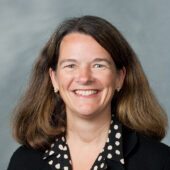WFU students ‘Wake the Vote’ for Election 2016
Since January, a group of students has traveled a long and winding political road with stops in Iowa, New Hampshire, South Carolina, New York, D.C., Cleveland and Philadelphia. The goal: experience democracy on the front lines and become more engaged citizens.
They are part of Wake the Vote, a year-long, bipartisan program mixing classroom discussion with real-world political experience.
“We’ve gone across the country. We’ve gone to different town halls, heard speeches and attended amazing debates. We’ve seen all these great things that are part of the American political culture, and we’ve really gotten to engage in a way that I think most young people don’t,” said sophomore Zachary Bynum, who, as part of the Wake the Vote group, has discovered his passion for grassroots organizing and digital democracy.
The students have been to Clinton rallies and to Trump rallies. So, regardless of who is elected on Nov. 8, they will have attended an event with the next U.S. President.
“Wake the Vote has brought people together who have different opinions – to cultivate conversation, to talk about difficult issues, to be involved in the political process and to be civically engaged as college students.” Hannah Dobie, senior politics and international affairs major
Along the campaign trail, students learned about key election issues and saw the American political process in action. The group collected buttons and signs from Marco Rubio, Bernie Sanders, Ben Carson, John Kasich, Chris Christie and Jeb Bush campaign headquarters – names no one will see on the presidential ballot on Election Day.
They also met with dozens of key political and media figures, including former presidential speechwriter Peggy Noonan, Chelsea Clinton, Senator Cory Booker, Secretary of Education John B. King Jr., Secretary of State Madeline Albright, journalist Joy Reid, and late-night TV personality Stephen Colbert.
Newt Gingrich and Chelsea Clinton both tweeted at the group using the hashtag #WaketheVote.
In efforts to engage fellow students and the community in this year’s election, the students created the Wake the Vote Election Hub. The group has hosted debate watches, as well as lectures and panel discussions featuring diverse political perspectives on key election issues.
For additional information on Wake the Vote and the Wake the Vote Election Hub, go to the Wake the Vote website. Chronicling their experiences has been an essential part of the program, so reflections from students on their experiences since the start of the year are also on the website.
More on Wake the Vote
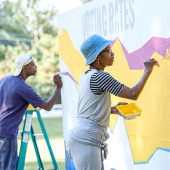 Wake the Vote hosts election-themed art exhibit, ‘Up to Us’: Wake the Vote is hosting an election-themed exhibit “UP to US” as part of the Wake the Vote Election Hub. Inspired by the observations and experiences of students participating in the Wake the Vote program, the exhibit includes more than 35 works by 12 national artists.
Wake the Vote hosts election-themed art exhibit, ‘Up to Us’: Wake the Vote is hosting an election-themed exhibit “UP to US” as part of the Wake the Vote Election Hub. Inspired by the observations and experiences of students participating in the Wake the Vote program, the exhibit includes more than 35 works by 12 national artists.
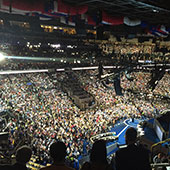 Wake The Vote students travel to GOP and Democratic National Conventions: Wake the Vote students attended the Republican National Convention in Cleveland and continued on to the Democratic National Convention in Philadelphia where they had the chance to experience democracy in action.
Wake The Vote students travel to GOP and Democratic National Conventions: Wake the Vote students attended the Republican National Convention in Cleveland and continued on to the Democratic National Convention in Philadelphia where they had the chance to experience democracy in action.
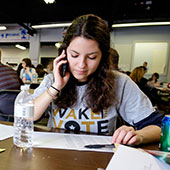 Wake the Vote: When 22 Wake Forest University students traveled to the Iowa caucuses to work with presidential campaigns, they embarked upon a yearlong journey to combine classroom and real-world political experience through a program called Wake the Vote.
Wake the Vote: When 22 Wake Forest University students traveled to the Iowa caucuses to work with presidential campaigns, they embarked upon a yearlong journey to combine classroom and real-world political experience through a program called Wake the Vote.
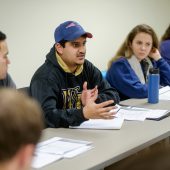
At a time when polarization drives many Americans away from politics and voter turnout among 18 to 29-year-olds hovers around 20 percent, a Wake Forest study shows that learning to talk about controversial issues while in college can inspire young adults to be more engaged citizens even 10 years later.
Categories: Experiential Learning, Mentorship, Research & Discovery

